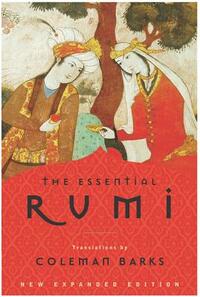Take a photo of a barcode or cover
I came to look at reviews at about 20% of the way through since I felt bewildered given Rumi's fame... things started to make sense after reading up on Coleman Barks "translating" methods. I plan to purchase Jawid Mojaddedi's version in hopes of getting more accurate translations since I do want to experience the beauty Rumi's words have to offer!
I absolutely loved, LOVED this work of poetry. So many poems spoke to me (which might have to do something with the fact this book was a gift from the guy I am dating - poetry is always more relatable when you're in love) and Rumi's words have proven to be timeless.
“When I am with you, we stay up all night.
When you're not here, I can't go to sleep.
Praise God for those two insomnias!
And the difference between them.”
― Rumi
However, I had to deduct one star for the poem about the girl that has sex with a donkey.
“When I am with you, we stay up all night.
When you're not here, I can't go to sleep.
Praise God for those two insomnias!
And the difference between them.”
― Rumi
However, I had to deduct one star for the poem about the girl that has sex with a donkey.
challenging
reflective
slow-paced
I was introduced to the Sufi mystic Rumi in a college Religion course on mysticism, and fell in love with the depth found in the simplicity of his words. I now use this book as a "Magic 8-Ball" of sorts...if I have a problem, I flip through it and stop at random, and read through Rumi's answer for me. His poetry is beautiful and his wisdom leaps off the page into your heart: "you are not a drop in the ocean, you are the entire ocean in a drop," "maybe you are searching among the branches, for what only appears in the roots," are only a few of my favorites. Rumi is truly timeless.
I'm not sure what quirk of personality has led me to find the most exquisite expressions of how I feel about people, life, the universe, and the meaning of everything in the poetry of ancient Sufi mystics, but time and again, I find myself turning to either Daniel Ladinsky's translations of Hafiz, or Coleman Barks' translations of Rumi for inspiration. The back cover of this book has a good quip on Barks' skill: "His ear for the truly divine madness in Rumi's poetry is remarkable." Rumi's irreverent, sometimes beautifully meandering, often funny, always graceful love poems to his god (indeed, to the universe) are not to be missed. This collection took me nearly a year to get through, because so many little pieces of it jump out to be savored before moving on to the next poem, stanza, or even line, but I know I'll be returning to it again and again. In the words of Jelaluddin Chelabi, the living descendant of Rumi's lineage, "Love is the religion, and the universe is the book."
emotional
inspiring
reflective
medium-paced
adventurous
emotional
mysterious
reflective
medium-paced
hopeful
reflective
slow-paced
Ah Coleman Barks. The man credited with “translating” Rumi’s work, whilst not knowing any Persian, and having nothing to his name that qualifies him to be “translating” Persian and Sufi poetry other than being, oh! A white man who wanted to :))
This man diluted and stripped Rumi’s work so it no longer includes any mention of Islam or specifically Sufism. There are longer and better written reviews that go into more detail about what Barks’ “translations” have done so I will end this by saying if I could give this 0 stars I would, and if you’re looking to read Rumi’s work for what it truly is, stay clear of this orientalist garbage xx
This man diluted and stripped Rumi’s work so it no longer includes any mention of Islam or specifically Sufism. There are longer and better written reviews that go into more detail about what Barks’ “translations” have done so I will end this by saying if I could give this 0 stars I would, and if you’re looking to read Rumi’s work for what it truly is, stay clear of this orientalist garbage xx
Coleman Barks is actually an INTERPRETER of the translations of other English translations of Rumi, not at all a translator. He does not even know Persian. He also took huge liberties with his interpretations, erasing huge parts that were integral to who Rumi was and what he wanted to teach (read the New Yorker article “The Erasure of Islam From The Poetry of Rumi” by Rozina Ali). This book is basically whitewashed Rumi poems. He also does not give any credit to the translators whom he paraphrases and allows himself to be celebrated as a translator. William Chittick is one of the translators whom he paraphrases and is a professor of Islamic studies at Stony Brook - he has a more truer selection of translated Rumi.




